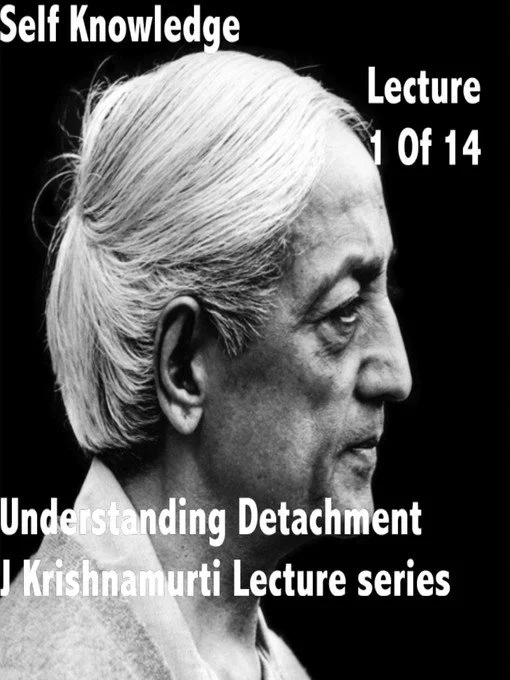Lecture 1 of 14: Listening to Jiddu Krishnamurti
Last week, I finished listening to Lecture 1: Understanding Detachment. As mentioned in my introductory post last week, the pace is slow, but the pauses feel intentional, and I notice myself reflecting more deeply because of that. Jiddu Krishnamurti’s voice is calm, unhurried, but each word lands like a stone dropped in still water. He asks: Does self-knowledge come through searching? And beneath it: What are we seeking when we search—truth, happiness, or merely gratification?
He says we must question the very nature of this search. We think we are pursuing something noble, but perhaps what we are really after is comfort, satisfaction. We want to be gratified and call it the search for truth. When we seek from that place, he says, we are not free; we are caught in desire. Searching becomes another form of escape, a way of avoiding what is.
Happiness, he says, cannot be found through search. It is not to be discovered in books, through teachers, or in following any path. These things may stimulate thought, but they cannot give truth. Truth is not a result of accumulation. Happiness is there only when the mind is very quiet, when it is no longer seeking an end to gain something. In Krishnamurti’s own words:
As long as the mind is not very quiet, silent, tranquil receptive, sensitive, it is not possible to understand; and this sensitivity of the mind is not merely at the upper level of consciousness, in the superficial mind. There must be tranquillity right through, an integrated tranquillity.
This made me think. How often have I confused the pursuit of satisfaction with the love of truth? How often has my so-called earnestness been just another form of ambition?
Krishnamurti says to be truly earnest is to see clearly what we are seeking and why. To see that as long as we search with the hope of reward, we will never be free.
I think it is very important that we should be most earnest. […] But I would like to find out what we mean by being earnest, by being serious. […] So, before we begin to find out what it is to be earnest, surely we must find out what it is that we are seeking.
I treat his words as an invitation to look honestly. Perhaps self-knowledge does not come through searching at all, but through understanding what is—here, now—without distortion.
My Reflection:
Searching, when driven by desire for gratification, becomes an escape.
Books, teachers, or systems cannot give truth and happiness.
Earnestness means clear perception, not effort for a result.
Self-knowledge is in seeing what is, in the present, without seeking reward, i.e., any desired outcome or end-goal that shapes how we look at ourselves (e.g., improvement, peace, validation, security, achievement).
Krishnamurti’s insight is that as long as our observation of ourselves is tied to reward, we’re not truly observing—we’re editing. We see what we want to fix, avoid, or amplify, not what is actually there. The “reward” becomes a lens of distortion.
—
From today until the end of September, I plan to listen to a series of lectures given by Jiddu Krishnamurti in 1949 to an audience in Ojai, California. These lectures—14 of them—are digitally remastered recordings available in an audiobook collection from NLB.
Related posts:
